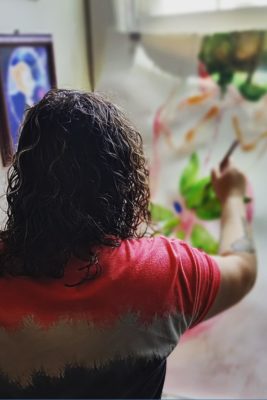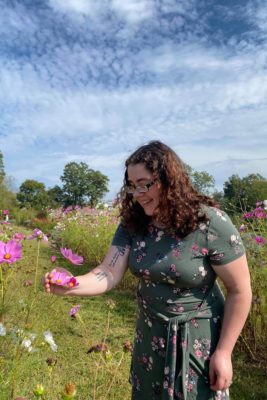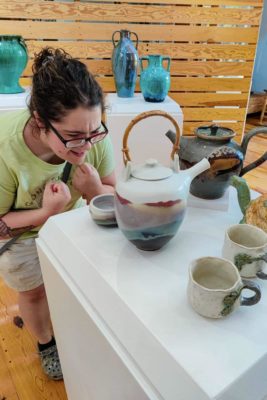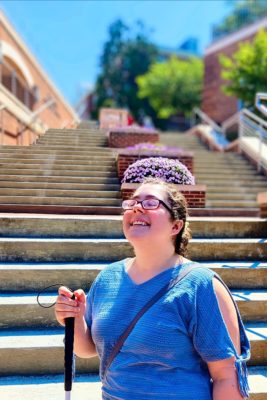Victoria Hauck ’26 isn’t your typical first-year. She’s 29, a licensed massage therapist, and an artist. She’s also legally blind.
“I’ve been like this since I was born, but it is progressive,” Hauck said during a recent interview. “It plateaued in my 20s, but they suspect that it will start degrading again in my late 30s.
“That’s the future. I have no control over that. I’m just gonna do what I can with what I have now.”

Doing what she can includes making art — such as paintings and pottery — and going back to school to get her bachelor’s degree in art therapy. Ultimately, she wants to earn a graduate degree in psychology.
The Virginia Department for the Blind is paying for her education, while her part-time job at True Healing Massage covers her rent and other living expenses.
Hauck loves being a massage therapist and reflexologist. The flexible schedule allows plenty of time for school and her many hobbies — all the things that “make life worth living,” she said.
What’s even more important, though, is that one doesn’t need to see to be successful in massage therapy.
“I just needed something I could do as a blind person, that, even if I lost my vision entirely, and I’m not going to be able to paint anymore, I can at least have that career to fall back on,” Hauck explained.
“And I can do excellent in that career because it’s by feel anyway. But I knew that was not my main calling. The main calling was not becoming a licensed massage therapist, just a licensed therapist.”
As someone who has struggled with her own mental health over the years, Hauck hopes a career as a therapist won’t just be a good fit as her eyesight deteriorates. She’s also hoping to get better help and find more answers.

“I need to go deeper, I need to understand more, and that’s what this step is in the process,” she said.
Massage therapy was the first thing she went back to school for after finding a fresh start in Lynchburg in 2015. Growing up homeschooled in a rural and strictly religious home in the Northeast, Hauck joined what turned out to be a cult when she was 18. She wrote about it last year in ICSA Today.
At 22, after leaving the group and moving back in with her parents, Hauck followed her best friend to Lynchburg.
“I was like, ‘Whatever town you move to, that’s the town I’m going to move to,’” she said. “I can’t drive, so I’m very reliant on public transportation. Where I lived there was none of that.
“Lynchburg … had public transportation, it was affordable to live here. It had a small-town vibe, but still stuff to do.”
Hauck got involved in the local art scene and met a University of Lynchburg student whom she later married (and divorced). Spending a lot of time with him on campus made the decision easy when she decided to get her college degree.
She remembers thinking, “‘I know that this is a place that jives with me, I know the ethic here, I know the values here, I feel connected to that, and I have that small-town on-campus feel — I know where everything is’,” she said. “That was honestly a big part of it.
“As someone who has accessibility, orientation, and mobility issues, having a small campus is better. And having one that’s familiar is even greater than that.”
In her first few months, Hauck has found a lot of support from staff on campus, including in the University’s accessibility office and the library. She’s figured out how to get her work done while also working, and how to access some of the trickier assignments.

The Commuter Lounge has become her home base. She loves Lynchburg’s “liberal arts vibe,” the many cultural events, and the fact that “the students here are pretty chill. It’s a free-thinking place.”
While she’s only taking classes on Tuesdays and Thursdays, Hauck is already leaving her mark on campus. Her watercolor paintings can be seen outside the Westover Room in Drysdale Student Center — thanks to fellow artist and faculty member Dr. Bosco Bae, who encouraged her to show them off. She’s also spent a lot of time making pottery at the Academy Center of the Arts, which featured her in last year’s giving campaign.
Despite the visual challenges she faces, art has been a vital part of Hauck’s life since she was a child. “You just hold on to the crayon and you never let go,” she said, recalling an artist neighbor who on Saturdays taught her how to oil paint with large brushes, freeing her from a perfectionist obsession with detail.
Hauck rediscovered her passion for art after moving to Lynchburg. Because she had roommates, she traded the oil for watercolors, and it’s become her “main thing.” But what distinguishes her art from most of the watercolors in this area is that it’s not landscapes — and that’s a hard sell for many people.
“I can’t see reality well anyway, so I don’t see why I should paint it,” Hauck argues. “Landscapes do very little for me — I don’t see landscapes. Everything is just color blobs.”
She mostly paints for herself now — things like surrealist portraits. It’s also what got her into ceramics. “I need to have art that I’m not worried about selling,” she said. “I want to make art because this is what I want to make.”

It’s important for Hauck to be involved, and she’s “gained a good community” in her seven years here. She sits on the board of Rush Homes, a local nonprofit that advocates for disability housing.
“I just have lots of chaotic energy that needs to be poured into projects at all times,” she said.
She’s planning to start a support group for others who have experienced religious trauma. But that’s down the road. For now, she’s trying to get that degree so she can go to grad school.
“My advice for nontraditional students who are thinking about going back to school is, don’t worry about how long it will take to get a degree. Time will pass and you will get older no matter what, so just jump right in,” Hauck said.
“And for my fellow disabled friends, you can take the dive, too, even if you don’t have every detail worked out. Reach out for help, ask questions of the staff — that’s what they’re here for. You deserve this as much as anybody.”

